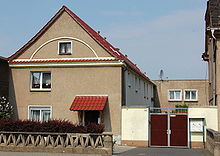Richard Krams
Richard Krams (born October 12, 1920 in Coswig (Anhalt) ; † December 22, 1998 in Magdeburg ) was a professional pedagogue, director of VEB Fahlberg-List , one of the largest chemical companies in the GDR. He was also the SED of the People's Chamber of the GDR.
Life
Krams first attended secondary school and then began an apprenticeship as a chemical laboratory assistant at the Coswig chemical plant , in which his father was already employed as a foreman . As a German soldier, Krams was seriously wounded during the Second World War and was released from the Wehrmacht in 1945. Krams then worked in the Coswig chemical plant and organized the training of skilled workers. He took over the management of the Geschwister Scholl teaching combine and developed a method for vocational education that was based on the unity of theoretical training and independent work in production. This approach was later applied across the country in the GDR. In 1951, Krams was honored as an Honored Teacher of the People . For the SED he was a member of the People's Chamber of the GDR in the 1st and 2nd electoral terms.
After working at the Rüdersdorf phosphate plant , he became director of the VEB Fahlberg-List chemical plant located in the Salbke district of Magdeburg in 1953 . In 1956 he graduated from the Technical University of Merseburg with a degree in engineering economics . During his studies, which according to other sources lasted from 1956 to 1958, Alfred Zarpentin took his place as director.
Under the management of Krams, the production as well as the product range of Fahlberg-List was expanded significantly. Plants for the production of sulfuric acid , superphosphate , pesticides and pharmaceutical products were newly built. In 1960 the traditional Schönebeck company Hermania was taken over. In 1970, according to another source in 1971, he gave up his position as director of the plant, but stayed with the company and became director of plan implementation and deputy operations director. These roles also included the duties of production director. The replacement as plant director was later described by Krams as politically justified. He retired in October 1985. At least in the 1990s he lived in Alt Salbke 58 in the immediate vicinity of the factory premises. The plant was closed in 1995 after the political turning point in 1989 .
Krams was a member of the SED and was one of the new founders of Magdeburg Urania . After being named Honored Teacher of the People, he was named an Honored Activist in 1965. In 1970 he received the GDR Medal of Merit and in 1984 the Order of the Banner of Labor Level 1.
literature
- Karl-Heinz Busch. In: Guido Heinrich, Gunter Schandera (ed.): Magdeburg Biographical Lexicon 19th and 20th centuries. Biographical lexicon for the state capital Magdeburg and the districts of Bördekreis, Jerichower Land, Ohrekreis and Schönebeck. Scriptum, Magdeburg 2002, ISBN 3-933046-49-1 , p. 382.
Individual evidence
- ↑ Handbook of the People's Chamber of the German Democratic Republic, [2. Electoral period], Berlin 1957, p. 330.
- ↑ Busch, Magdeburg Biographical Lexicon, page 382
- ↑ Herbert Rasenberger , From the sweet beginning to the bitter end - 110 years of Fahlberg-List in Magdeburg , dr. ziethen verlag Oschersleben 2009, ISBN 978-3-938380-06-2 , p. 109.
- ↑ Herbert Rasenberger, From the sweet beginning to the bitter end - 110 years of Fahlberg-List in Magdeburg , dr. ziethen verlag Oschersleben 2009, ISBN 978-3-938380-06-2 , p. 109.
- ↑ Busch, Magdeburger Biographisches Lexikon, p. 382.
- ↑ Krams, Memorabilia , City Journal of May 16, 1997, quoted in Rasenberger, From the sweet beginning to the bitter end , p. 224.
- ^ The Blue Address Book City of Magdeburg 1994/95 , p. 359.
| personal data | |
|---|---|
| SURNAME | Krams, Richard |
| BRIEF DESCRIPTION | German professional pedagogue, director of a chemical company (SED), MdV |
| DATE OF BIRTH | October 12, 1920 |
| PLACE OF BIRTH | Coswig (Anhalt) |
| DATE OF DEATH | December 22, 1998 |
| Place of death | Magdeburg |
